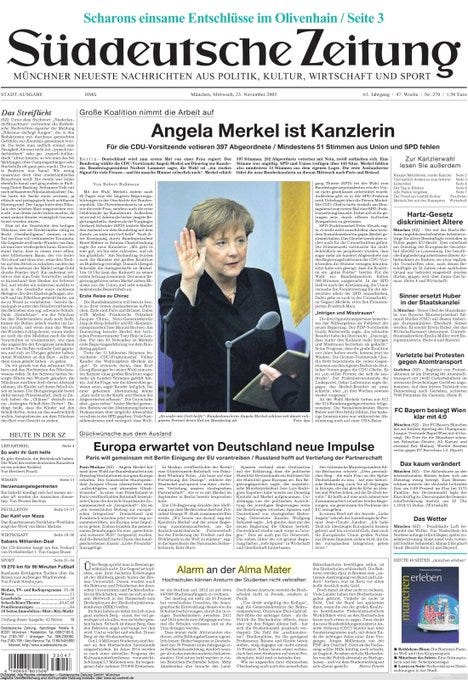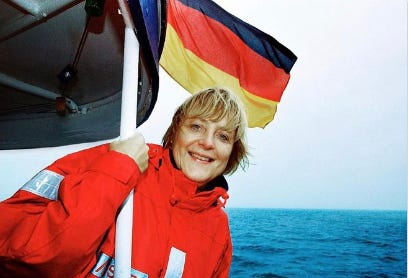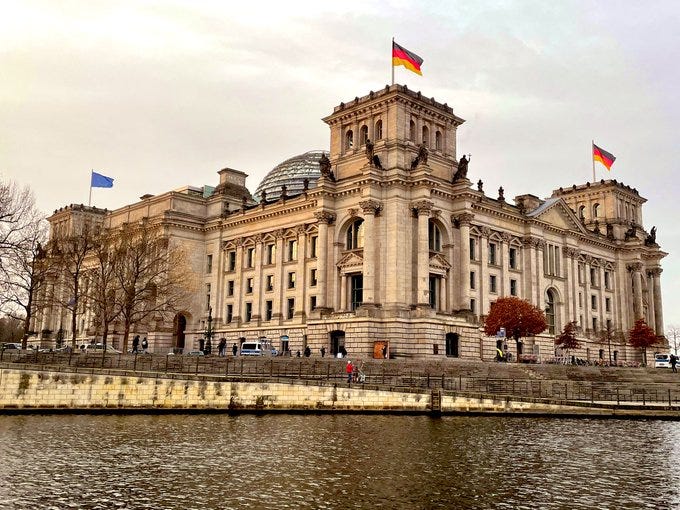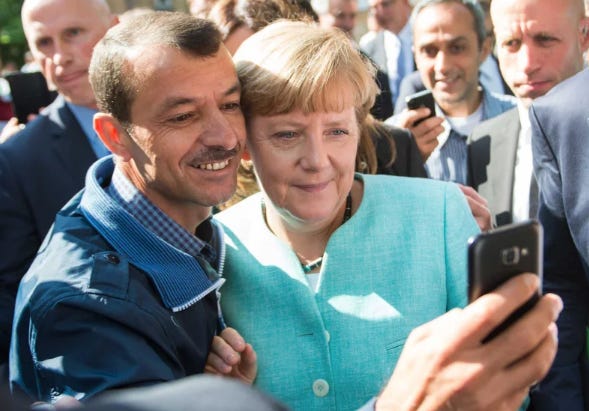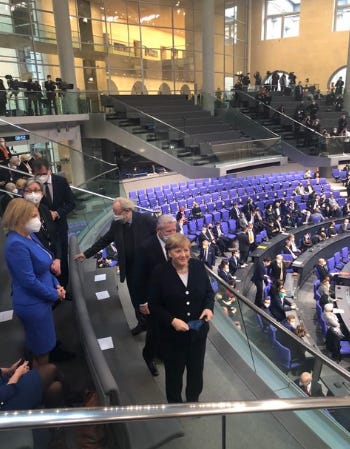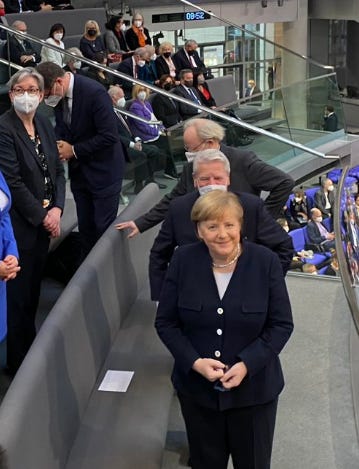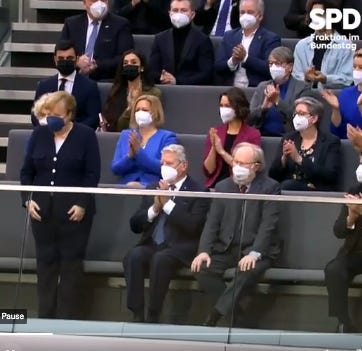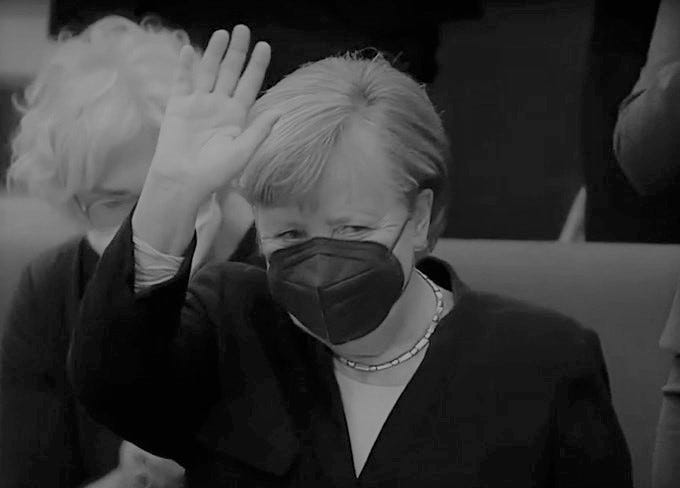Goodbye Merkel: Chancellor, Queen of Europe, German's Mother Theresa for Refugees, and Disney Princess
I still remember this moment. Merkel eulogy, after Germany lost to Italy at home, in the World Cup 2006 (halbfinale, or semifinal stage, Westfalen Stadium Dortmund). July 5th 2006, 1 day after US Independence. Merkel on lil bit of a regret, because with (shockingly) bad mood after the loss, she thought it would be really hard to make sure of a new plan (raising tax) on July 6th to the (bad mood) German people. Merkel only in Day-225 at the seat.
Deja Vu. Merkel replaced Schroeder when an extraordinary relation happened between transatlantic (US-Europe). Germany, and France (symbol Chirac-Schroeder) refused to join the Iraq Aggression (2003). Even after 2 years, in 2005, the situation between US and Europe (and especially US and Germany) lil bit awkward. And towards her last day, the tension between US-Europe is back on the hot seat after the AUKUS forge between US, UK, and Australia. Christoph Heusgen, the most Foreign Policy adviser for Merkel said (AUKUS) ‘insult to a Nato partner’ - in context Germany's buddy France. Heusgen is the 2nd prominent German who show the flawless support from Germany to France on AUKUS rift, after Ursula von der Leyen (EU Chief). merkel didnt want a "symbol", but real implement for normalization trans atlantic, US - Europe, although Merkel had to comment (officially) about AUKUS. Or Merkel decided to never comment on AUKUS, to ease whoever the winner of the election.
September 26th Germany will go to the polls to vote for a new national parliament. Out of that parliament a new national government will emerge, but Merkel will likely have to stay in office for a little while longer. Merkel did not immediately leave the office, and just because the polls (currently) are very tight not only CSU-CDU vs SPD but also Green. Renewable issue are betting that the leading contender in the race to become next “Bundeskanzlerin” candidate Annalena (Anna) Baerbock, surprisingly “the little Merkel” (despite Anna actually from Green Party) will unleash changes allowing more market access and a fairer playing field after years of neglect.
Immediately after the election, Merkel and her cabinet will continue to run the country in a caretaker capacity until a new government can be built. If history is any guide, this could take anywhere from one month to half a year. If “hung parliament” or some like this after the “German Election”, Merkel will still be in the seat (in the worst scenario) until “Weihnachten” (Christmas 2021).
Merkel will be the first Chancellor to leave the top job at a time of her own choosing. While Merkel did face internal pressure in her CDU party to step aside after the refugee crisis, she held on to name autumn 2021 as her end date, and not being forced to leave the seat because of losing the election.
After all, on July 6th 2005 Merkel really implemented new regulation on (higher) tax, and surprisingly, to be one of the best Merkel decisions, brought Germany to be a powerhouse economy in the world, not only Europe.
In her 16 years as German chancellor, Merkel has seen two Russian Presidents, four US and French Presidents, five UK prime ministers and nine Italian and Japanese premiers. Sometimes described as the most powerful woman in the world, she has also presided over a national economic revival. On chaotic Trump age, With tensions growing between Europe and the nascent Trump administration, it will largely be up to Germany to ensure the transatlantic relationship doesn’t veer off track.
Perhaps most remarkable of all, Merkel, who enjoys an 80 per cent popularity rating, has overseen vastly expanded job opportunities for women and the old, all while taking in more than 1,6 million refugees (2012-2014).
Yet the legacy Merkel leaves Germany after the September federal election is mixed. A common criticism is that while she has proved a deft crisis manager, her three terms as chancellor lacked vision and left Germany unprepared for a greener and more digitized world. Some joke, Germany broadband is even slower than a horse. Another criticism, all Angela Merkel’s achievements on foreign policy over the years, the most significant for Germany’s relationship with the rest of the world might be that few outside the country have ever heard of her Foreign Minister Heiko Josef Maas, because Merkel “too much” taking a decision on FP directly.
The problem with Merkel’s approach to the foreign challenges she’s faced is that it’s been piecemeal and reactive. The Merkel chancellery has gradually seized full control over every key foreign affairs portfolio — from Europe to the transatlantic relationship to China. While it’s natural for a country’s leader to take on urgent questions of foreign policy, Merkel expanded her purview well beyond the norm to focus on questions such as the future of the Western Balkans and Libya.
credit pict for Laurence Chaperon
Exportweltmeister and Wirtschaftswunder
Since 2005, German gross domestic product per capita has risen twice as fast as in the UK, Canada, Japan and France. Today, Germans can revel “second Wirtschaftswunder”, or economic miracle. With unemployment near a two-decade low, almost 70 per cent of Germans say they are happy with their economic situation. This success, even after Germany send a 50 billion euro to helping monetary crisis in Greece.
However, not all of that success is thanks to Merkel. Much of its groundwork was laid with reforms by her predecessor, Gerhard Schröder. Furthermore, German manufacturing, which now accounts for 40 per cent of all eurozone output, piggybacked on the rise of China. Today, German dependence on China as an export market is uniquely high in the eurozone. Still, Merkel did not just stand by as Germany grew rich. Her response to the 2009 financial crisis, such as a cash-for-clunkers scheme that supported car sales, helped to shelter the economy. So too did her decision to funnel billions of euros into Germany’s Kurzarbeit programme, a government unemployment insurance system. One consequence of that has been Germany’s success in creating jobs.
Jobs, jobs and more jobs.
Arguably, the Merkel era’s biggest achievement has been an extraordinary rate of job creation — especially for women. Germany today has the highest rate of female labour force participation among all G7 countries, helped by improved childcare. Just as remarkably, employment increased among immigrants. It took courage for Merkel to stick to her 2015 policy that brought in and then integrated more than 1,6 m refugees fleeing war in Syria, Afghanistan and Iraq. As she once put it, “we can do this”. Then she did. With a very big pressure to provide a job for Germans and refugees, Merkel did.
The same is not true, though, for the quality of employment. A high share of workers remain in low-earning jobs, with little improvement over the past two decades. Many women’s jobs also remain part-time, and only one company in Germany’s blue-chip Dax index has a female chief executive. Little debt, but not much vision or investment either.
Despite the pandemic, Germany is now almost as rich as it has ever been. Government accounts are broadly healthy with relatively low levels of debt, in part thanks to the 2009 balanced budget law. But, by the same token, with everything seemingly going so well, Despite the growth and rise in jobs, there has been little modernization. Critics add that low rates of public investment have left the country ill-prepared for the future. The country’s shift to renewable energy accelerated after the 2011 Fukushima nuclear reactor incident in Japan and with Germany’s more recent plan to phase out coal power by 2035. For the Greens, which are almost certain to be part of any coalition, plus candidate from Green Anna Baerbock, the biggest priority is a super-charged environmental portfolio.
Even so, the country lags behind EU peers. Its per capita greenhouse gas emissions are above EU averages, it has a lower share of energy from renewable sources, and also higher CO2 emissions from new passenger cars. Much the same is true of Germany’s shift to the digital economy. Lack of investment has led to low penetration of high-speed broadband, an urban-rural divide in connection speeds and below-average mobile broadband data consumption. All these sectors “were not given the necessary attention. The lack of investment has probably been the biggest weakness of Merkel’s economic policy legacy.
Even before the pandemic, Germany needed an estimated €450bn of public investment to begin to decarbonise, improve communications, boost education and strengthen infrastructure — which failed to contain this summer’s floods. Indeed, the need for more investment has become a rallying cry among some of the candidates now vying to succeed Merkel. The Covid-19 crisis put a magnifying glass on [Merkel’s] shortcomings, which the incoming government will need to address to ensure that the green and digital transition are a success.
DC-Berlin: after Trump, now AUKUS
Building a relationship with Trump’s team won’t be easy. Berlin’s positions, on issues as varied as climate change, the Iran nuclear deal and Russia often stand in direct opposition to what Trump has articulated.
But it wouldn’t be Merkel uphill battle with Washington. 2005, German-U.S. relations were at a low in the wake of the Iraq war. And yet despite those lingering tensions, he managed to build a strong rapport with key figures in President George W. Bush’s administration, including Secretary of State Condoleezza Rice and Stephen Hadley, the national security adviser. Merkel sent Christoph Heusgen, her really close adviser, to make a better relationship with Susan Rice, Obama’s national security adviser, is even closer.
The difference this time, however, is Trump’s inner circle is not part of the foreign policy establishment. Merkel's approach to China, Russia and global trade is well outside the mainstream. And Merkel actually really give a big help for Biden with Ramstein on evacuation Afghanistan allies. At least 30k refugees landed on Ramstein before going to US soil. But on AUKUS only 2 weeks before the Germany Election, at least, Merkel (indirect) used Heusgen and Ursula to show, whatever Biden said about AUKUS, Germany give full support for France (& Macron).
Women in Germany
Ursula von der Leyen, a Merkel Cabinet stalwart, became the European Commission's first female president in 2019. Annegret Kramp-Karrenbauer succeeded Merkel as leader of her CDU in 2018, and Defense Minister
In 2007, von der Leyen, who was then family minister in Merkel's Cabinet, pushed through a progressive reform of the country's child-raising allowance which encouraged fathers to take some parental leave after the birth of a child. However, it was one of few legal changes during the chancellor's tenure that actively sought to improve the situation of women.
One reason for Merkel's reluctance to fight more openly for feminist issues in Germany may be her own struggle to get to the top of German politics. Influential men in her conservative, traditionally West German and Catholic-dominated party didn't exactly welcome the Protestant former East German physicist with open arms, and male politicians from other parties initially did not treat her respectfully.
German journalists' comments on Merkel's appearance were often openly sexist, particularly in the beginning. German media first dubbed her “Kohl's girl,” because Merkel was initially promoted by then-Chancellor Helmut Kohl, and later called her “Mutti,” or “mommy,” even though Merkel has no children.
Nonetheless, Merkel could have done more for women's rights and noted that none of Merkel's Cabinets throughout her four terms achieved gender parity. When Merkel herself was asked in 2017 whether she was a feminist, she answered evasively, saying: "I don’t want to embellish myself with a title I don’t have.”
Only in the last few years did Merkel take up the topic proactively and speak out for more gender equality in Germany. In 2018, as Germany marked the 100th anniversary of women’s suffrage, she said in a speech in Berlin to the loud applause of mostly female listeners that there was a lot still to do to achieve gender equality.
“The goal needs to be equality, equality everywhere,” she said. Merkel continued “I hope it becomes natural for women and men to split up work, raising the children and doing the household equally ... and I hope it's not going to take another 100 years to get there.”
Merkel has talked little about her experiences of discrimination or her personal life and her husband, quantum chemist Joachim Sauer, has kept a low public profile.
In the last few weeks, Merkel took a noteworthy step in further embracing women's rights, declaring at a discussion with women in Duesseldorf: “I'm a feminist. Yes, we should all be feminists,” she added.
After Merkel
Whether the next chancellor is Annalena Baerbock, Armin Laschet, or Olaf Scholz, Germany will, for the foreseeable future, remain a stable and tolerant democracy. None of the three have the character or the desire to emulate the authoritarian populists who have been ascendant in so many countries over the past years. Meanwhile, the far-right Alternative for Germany, which took a record share of the vote four years ago, is likely to lose support this time around.
The bad news about this German election is the same: It won’t change the country very much. Under Merkel, Germany has been less of a beacon for democracy or human rights than most international observers believed. The country deepened its economic ties with China, pressed ahead with a gas pipeline that was important to the Kremlin, empowered budding autocrats in Poland and Hungary, and struck immoral deals with dictators in Turkey and elsewhere. The same hypocrisy is likely to characterize Germany’s foreign policy once Merkel is gone.
Those who care about democracy and human rights have little reason to worry about Germany. But they also don’t have much reason to invest big hopes in its leaders, past, present, or future. Merkel’s departure from office feels like a historic caesura. But both for good and for ill, her country will change little after she is gone.
Angela Dorothea Merkel,... Danke Mam.
photo by Bernd von Jutrczenka—EPA
*credit to Barbara Kostolnik & Andreas Rinke for Merkel photo in #Kanzlerwahl (Dec. 8th, 2021)




